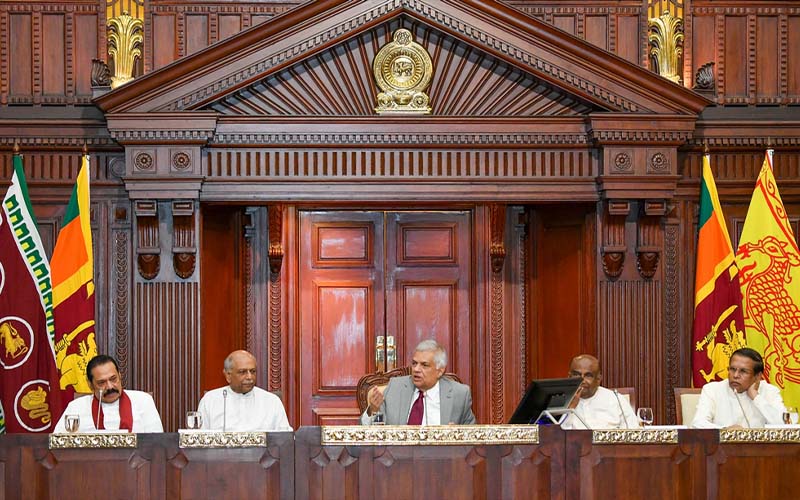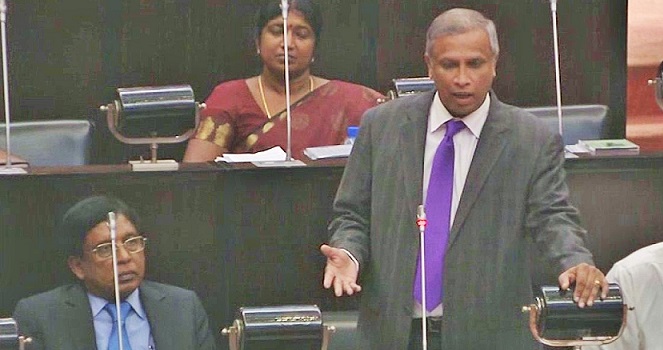
Speaking before Sri Lanka’s All-Party Conference, Sri Lankan President Ranil Wickremesinghe maintained a “middle position” on the 13th amendment is no longer tenable and stressed that “either we ought to get rid of the 13th amendment or should implement it”.
In his statement, Wickremesinghe maintained his fundamental opposition to a federal solution and compared the few powers devolved to provincial councils in terms of those “vested in the London City Council”. He stressed that he would not divide the country nor “betray the Sinhalese”.
Discussions with the TNA breakdown

Wickremesinghe’s comments follow the fallout from failed negotiations with the Tamil National Alliance (TNA) in which the TNA put forward an ultimatum to meet three key Tamil demands; implementation of the 13th amendment; release of Tamil land occupied by the Sri Lanka military; and the release of Tamil political prisoners. Discussions between the TNA and the government have broken down following the government’s failure to produce an update on what steps had been taken towards meeting these demands.
“We have been listening to the same story and nothing is done. Why should we listen to something we know will not be done?” TNA MP Sumanthiran told the Sunday Morning.
On Twitter, Sumanthiran commented on the continued failure to implement the 13th amendment stating:
“Sri Lanka’s failure to fully implement the amendment is a reminder of the Sinhalese establishment’s apparent insecurity over sharing power”.
Wickremesinghe’s statement also follows a visit from India’s foreign minister, Subrahmanyam Jaishankar, in which he stressed the need for the implementation of the 13th amendment.
Read more here: India backs Sri Lanka for IMF funding but China dithers
13th Amendment is insufficient
![]()
Whilst the TNA, amongst other Tamil political parties, engaged in discussions with the government they faced heavy backlash from the Families of the Disappeared and Tamil civil society organisations who stressed the government’s unwillingness to meet Tamil demands and urged for an appeal to the international community.
For the Tamil National People’s Front (TNPF), the Sri Lankan government’s inflexibility on the question of federalism underlined the impotence of any engagement with the government.
In a letter to India’s foreign minister TNPF leader Gajendrakumar G. Ponnambalam emphasised that:
“Ever since the 13th amendment to the constitution of Sri Lanka was introduced, the Tamils have rejected it on the grounds that for as long as the structure of the State remains Unitary, no meaningful autonomy and self-government can be achieved”.
His letter highlighted how successive rulings from Sri Lanka’s Supreme Court has ruled against devolutions and maintained Colombo as “the sole repository of all power”. Thus, “the way in which the 13th amendment is practised today is, in fact, the 13th amendment being fully implemented”.
He further warned that an acceptance of the 13th amendment, even as a starting point, would pose a grave danger as “it would mean that the Tamils for the first time in our history will be accepting a unitary constitution”.
This statement was followed by a joint letter by a number of Tamil American organisations to the US House of Representatives stressing the need for an independence referendum and a federal solution to the ethnic conflict in Sri Lanka.
Read more here: TNPF urges India to bring about a federal solution
Yet, another commission
.jpg)
Speaking to the Tamil Guardian, Sumanthiran recognised that the 13th amendment alone was not sufficient to meet the aspirations of the Tamil people. He asserted however that it would be an important step to address the issue of land grabs.
“Currently, the biggest challenges will be in the areas of land grabs”, through the provincial councils “we could prevent that”, he argued. “When the land is taken away, the existence of the Tamil nation is put in peril [...] That power [over land] is crucial to protect what we have”.
In Wickremesinghe’s speech, he addressed the issue of land claiming that the release of land “should be entrusted with security forces to be done without causing interruption to the security activities. He noted his discussions with the island’s military leaders and claimed that a land commission should be established immediately. However, under a commission, control is still held under the presidency.
“The Constitution has it that nine representatives from each province should be included while 12 are appointed by the President” Wickremesinghe noted.
The promise of yet another commission comes as Tamil land across the North-East has been subject to military land grabs for decades. The military has occupied vast swathes of land belonging to Tamil for decades and despite local protest has engaged in a litany of operations including running fisheries and agriculture, often to the detriment of the local community.
The All-Party Conference was attended by a range of political leaders including the disgraced former Prime Minister and President Mahinda Rajapaksa who was forced to resign from his post during mass protests last year.
Read Wickremesinghe's full statement here.
